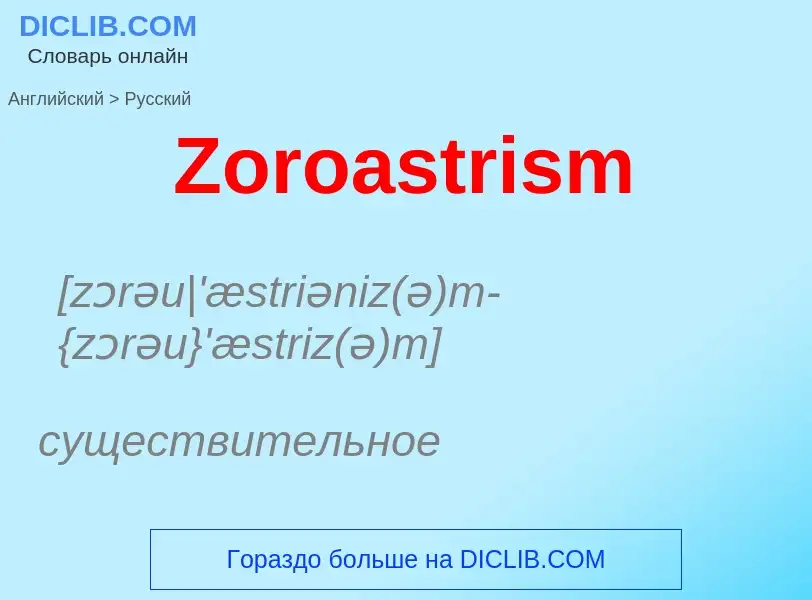Перевод и анализ слов искусственным интеллектом ChatGPT
На этой странице Вы можете получить подробный анализ слова или словосочетания, произведенный с помощью лучшей на сегодняшний день технологии искусственного интеллекта:
- как употребляется слово
- частота употребления
- используется оно чаще в устной или письменной речи
- варианты перевода слова
- примеры употребления (несколько фраз с переводом)
- этимология
Zoroastrism - перевод на русский
[zɔrəu|'æstriəniz(ə)m-{zɔrəu}'æstriz(ə)m]
существительное
религия
зороастризм
[pɑ:'si:iz(ə)m]
существительное
общая лексика
парсизм
Википедия
.jpg?width=120)
Zoroastrianism is an Iranian religion and one of the world's oldest organized faiths, based on the teachings of the Iranian-speaking prophet Zoroaster. It has a dualistic cosmology of good and evil within the framework of a monotheistic ontology and an eschatology which predicts the ultimate conquest of evil by good. Zoroastrianism exalts an uncreated and benevolent deity of wisdom known as Ahura Mazda (lit. 'Lord of Wisdom') as its supreme being. Historically, the unique features of Zoroastrianism, such as its monotheism, messianism, belief in free will and judgement after death, conception of heaven, hell, angels, and demons, among other concepts, may have influenced other religious and philosophical systems, including the Abrahamic religions and Gnosticism, Northern Buddhism, and Greek philosophy.
With possible roots dating back to the 2nd millennium BCE, Zoroastrianism enters recorded history around the middle of the 6th century BCE. It served as the state religion of the ancient Iranian empires for more than a millennium (approximately from 600 BCE to 650 CE), but declined from the 7th century CE onwards as a direct result of the Arab-Muslim conquest of Persia (633–654 CE), which led to the large-scale persecution of the Zoroastrian people. Recent estimates place the current number of Zoroastrians in the world at around 110,000–120,000 at most, with the majority of this figure living in India, Iran, and North America; their number has been thought to be declining.
The most important texts of Zoroastrianism are those contained within the Avesta, which includes the central writings thought to be composed by Zoroaster known as the Gathas, that define the teachings of Zoroaster and which are poems within the liturgy of worship, the Yasna which serve as the basis for worship. The religious philosophy of Zoroaster divided the early Iranian gods of the Proto-Indo-Iranian tradition into emanations of the natural world as ahuras and daevas, the latter of which were not considered to be worthy of worship. Zoroaster proclaimed that Ahura Mazda was the supreme creator, the creative and sustaining force of the universe through Asha, and that human beings are given a choice between supporting Ahura Mazda or not, making them ultimately responsible for their choices. Though Ahura Mazda has no equal contesting force, Angra Mainyu (destructive spirit/mentality), whose forces are born from Aka Manah (evil thought), is considered to be the main adversarial force of the religion, standing against Spenta Mainyu (creative spirit/mentality). Middle Persian literature developed Angra Mainyu further into Ahriman, advancing him to be the direct adversary to Ahura Mazda.
Additionally, the life force that originates from Ahura Mazda, known as Asha (truth, cosmic order), stands in opposition to Druj (falsehood, deceit). Ahura Mazda is considered to be all-good with no evil emanating from the deity. Ahura Mazda works in gētīg (the visible material realm) and mēnōg (the invisible spiritual and mental realm) through the seven (six when excluding Spenta Mainyu) Amesha Spentas.

.jpg?width=200)
![A scene from the [[Hamzanama]] where [[Hamza ibn ‘Abd al-Muttalib]] Burns Zarthust's Chest and Shatters the Urn with his Ashes A scene from the [[Hamzanama]] where [[Hamza ibn ‘Abd al-Muttalib]] Burns Zarthust's Chest and Shatters the Urn with his Ashes](https://commons.wikimedia.org/wiki/Special:FilePath/Hamza Burns Zarthust’s Chest and Shatters the Urn with his Ashes.jpg?width=200)
![Painted clay and [[alabaster]] head of a possible [[Zoroastrian]] priest wearing a [[Bactria]]n-style headdress, [[Takhti-Sangin]], [[Tajikistan]], [[Greco-Bactrian kingdom]], 3rd–2nd century BCE Painted clay and [[alabaster]] head of a possible [[Zoroastrian]] priest wearing a [[Bactria]]n-style headdress, [[Takhti-Sangin]], [[Tajikistan]], [[Greco-Bactrian kingdom]], 3rd–2nd century BCE](https://commons.wikimedia.org/wiki/Special:FilePath/Head of Bactrian ruler (Satrap), Temple of the Oxus, Takht-i-Sangin, 3rd-2nd century BC.jpg?width=200)
.jpg?width=200)
, Uzbekistan, 7-8th century CE.jpg?width=200)
![Parsi]]'' Wedding, 1905 Parsi]]'' Wedding, 1905](https://commons.wikimedia.org/wiki/Special:FilePath/Parsee Wedding 1905.jpg?width=200)

![A modern Zoroastrian [[fire temple]] in [[Western India]]<!-- please don't name it, could be confused with the Iranshah --> A modern Zoroastrian [[fire temple]] in [[Western India]]<!-- please don't name it, could be confused with the Iranshah -->](https://commons.wikimedia.org/wiki/Special:FilePath/Pundole Agiary Udvada.jpg?width=200)
![[[Sadeh]] in [[Tehran]], 2011 [[Sadeh]] in [[Tehran]], 2011](https://commons.wikimedia.org/wiki/Special:FilePath/Sadeh.jpg?width=200)
![A special container carrying the holy fire from [[Aden]] to the Lonavala Agiary, India A special container carrying the holy fire from [[Aden]] to the Lonavala Agiary, India](https://commons.wikimedia.org/wiki/Special:FilePath/Special Container Carrying The Holy Fire from Aden at Lonavala.jpg?width=200)
![fire temple]] of [[Baku]], c. 1860 fire temple]] of [[Baku]], c. 1860](https://commons.wikimedia.org/wiki/Special:FilePath/USSHER(1865) p012 BAKU, FIRE TEMPLE (cropped).jpg?width=200)
![Chak Chak]] in [[Yazd]], [[Iran]]. Chak Chak]] in [[Yazd]], [[Iran]].](https://commons.wikimedia.org/wiki/Special:FilePath/Zoroastrian Persian Shrine chak-chak Republic Ardakan.jpg?width=200)

